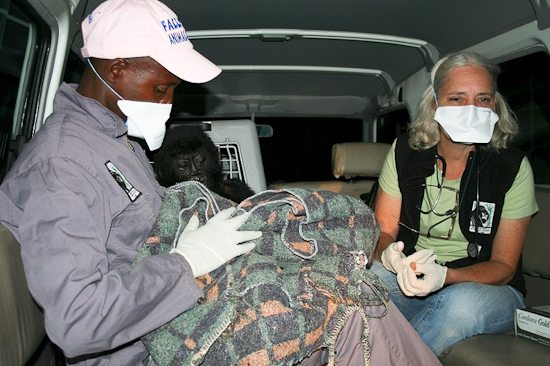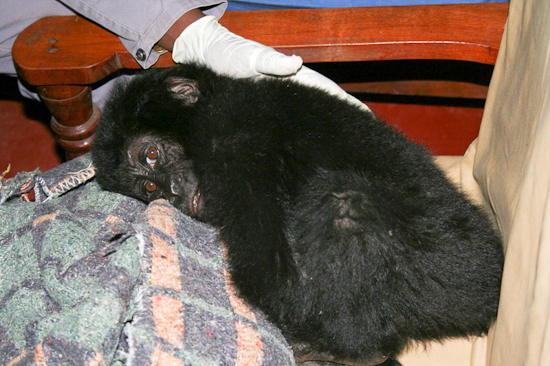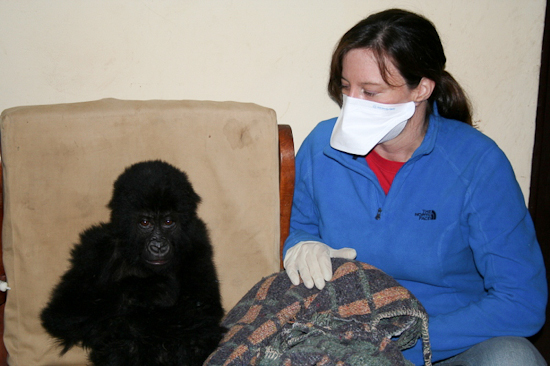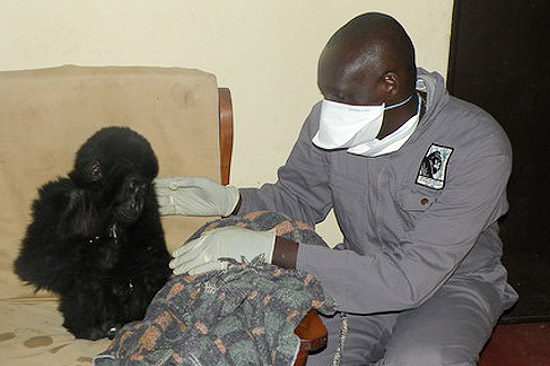BREAKING NEWS: Mountain Gorilla Orphan Confiscated from Poachers in Rwanda
By Gorilla Doctors Staff on Monday, August 8th, 2011 in Uncategorized. MGVP Caretaker Fabien Bahati and Dr. Jan Ramer with the orphan.
MGVP Caretaker Fabien Bahati and Dr. Jan Ramer with the orphan.
Musanze, Rwanda – On Sunday, August 7, police in the town of Gisenyi, Rwanda, arrested a group of Congolese and Rwandan men after they were caught smuggling an infant mountain gorilla from the neighboring Democratic Republic of Congo (DRC) to Rwanda. Veterinarians from the Mountain Gorilla Veterinary Project (MGVP), a nonprofit organization dedicated to conserving gorillas through health care, were called to the scene to help the infant. While primarily working with wild gorillas, MGVP also provides care to gorillas orphaned as a result of the illegal wildlife trade or armed conflict.
 The fearful orphan curls into a ball.“The MGVP team arrived at the Gisenyi police station at 10 pm to find a very stressed, exhausted mountain gorilla infant of less than one year of age,” says Dr. Jan Ramer, Regional Veterinary Manager of MGVP. The arrested men claimed that the gorilla was taken from the Bukima area of Virunga National Park in DRC. They said they had kept the gorilla for about a week, feeding him bananas and sugar cane. No other details were provided.
The fearful orphan curls into a ball.“The MGVP team arrived at the Gisenyi police station at 10 pm to find a very stressed, exhausted mountain gorilla infant of less than one year of age,” says Dr. Jan Ramer, Regional Veterinary Manager of MGVP. The arrested men claimed that the gorilla was taken from the Bukima area of Virunga National Park in DRC. They said they had kept the gorilla for about a week, feeding him bananas and sugar cane. No other details were provided.
“MGVP Orphan Caretaker Fabien Bahati, who has raised many orphan gorillas, scooped the gorilla up, and after a discussion with police we headed to Kinigi, Rwanda, to reopen the MGVP Orphan Quarantine Facility,” says Dr. Ramer. MGVP closed this facility only two weeks ago after transferring six resident Grauer’s gorilla orphans to the GRACE sanctuary in DRC.
 MGVP volunteer Amy Franklin with the orphan.“We got to Kinigi around midnight and did a short health inspection of the little boy: He had a very bad cough and a runny nose, but was strong,” says Dr. Ramer. “Fabien stayed with him overnight, and this morning the gorilla is even stronger.”
MGVP volunteer Amy Franklin with the orphan.“We got to Kinigi around midnight and did a short health inspection of the little boy: He had a very bad cough and a runny nose, but was strong,” says Dr. Ramer. “Fabien stayed with him overnight, and this morning the gorilla is even stronger.”
 Dr. Jean-Felix Kinani with the orphan.MGVP will work in close partnership with the Congolese and Rwandan wildlife authorities (L’Institut Congolais pour la Conservation de la Nature and the Rwanda Development Board) the International Gorilla Conservation Programme (IGCP), and Dian Fossey Gorilla Fund International (DFGFI) to determine the best course of action for the gorilla’s future. The orphan will most likely be transferred to the Senkwekwe center in Virunga National Park, which is currently home to four other orphan mountain gorillas: Ndeze, Ndakasi, Maisha, and Kaboko. In the meantime, the gorilla rescued last night will undergo a 30-day health quarantine at the Kinigi facility, where he will receive 24-hour care provided by the MGVP staff and DFGFI Orphan Caretaker Jean De Dieu.
Dr. Jean-Felix Kinani with the orphan.MGVP will work in close partnership with the Congolese and Rwandan wildlife authorities (L’Institut Congolais pour la Conservation de la Nature and the Rwanda Development Board) the International Gorilla Conservation Programme (IGCP), and Dian Fossey Gorilla Fund International (DFGFI) to determine the best course of action for the gorilla’s future. The orphan will most likely be transferred to the Senkwekwe center in Virunga National Park, which is currently home to four other orphan mountain gorillas: Ndeze, Ndakasi, Maisha, and Kaboko. In the meantime, the gorilla rescued last night will undergo a 30-day health quarantine at the Kinigi facility, where he will receive 24-hour care provided by the MGVP staff and DFGFI Orphan Caretaker Jean De Dieu.
“We are cautiously optimistic for this little guy—he is tense, but accepting of people, and is eating,” says Dr. Ramer. “All are good signs for his eventual recovery.”
About Mountain Gorillas
With only 786 individuals left in the world, mountain gorillas are a critically endangered population. Mountain gorillas live in central Africa, with about 480 animals living in the 173-square-mile Virunga Volcanoes Massif, which combines Volcanoes National Park in Rwanda, Virunga National Park in the Democratic Republic of Congo, and Mgahinga National Park in Uganda. The remaining population lives within the boundaries of the 128-square-mile Bwindi Impenetrable National Park in Uganda.
About the Mountain Gorilla Veterinary Project
The Mountain Gorilla Veterinary Project, a U.S.-based nonprofit organization, is dedicated to saving mountain gorilla lives. With so few animals left in the world today, the organization believes it is critical to ensure the health and well being of every individual possible. The organization’s international team of veterinarians, the Gorilla Doctors, is the only group providing wild mountain gorillas with direct, hands-on care. The Mountain Gorilla Veterinary Project partners with the UC Davis Wildlife Health Center to advance One Health strategies for mountain gorilla conservation. www.gorilladoctors.org
About the UC Davis Wildlife Health Center
The UC Davis Wildlife Health Center, home of the Mountain Gorilla One Health Program and a center of excellence within the School of Veterinary Medicine, is composed of 13 epidemiologists, disease ecologists and ecosystem health clinicians and their staff working at the cutting edge of pathogen emergence and disease tracking in ecosystems. It benefits from the expertise of 50 other participating UC Davis faculty members from many disciplines who are involved in the discovery and synthesis of information about emerging zoonotic diseases (those transmitted between people and animals) and ecosystem health. Its mission is to balance the needs of people, wildlife and the environment through research, education and service. www.vetmed.ucdavis.edu/whc.
Media Contact
Molly Feltner, MGVP Communications Officer
+1-857-719-9258
Please consider supporting MGVP by making a secure online donation. Every dollar you give goes to directly supporting our gorilla health programs and One Health initiative. Thank you for your generosity. For the most up-to-date information about the Gorilla Doctors, “like” our Facebook page. You’ll find gorilla health reports, news items, photos, videos, and links to related content.


 Donate
Donate